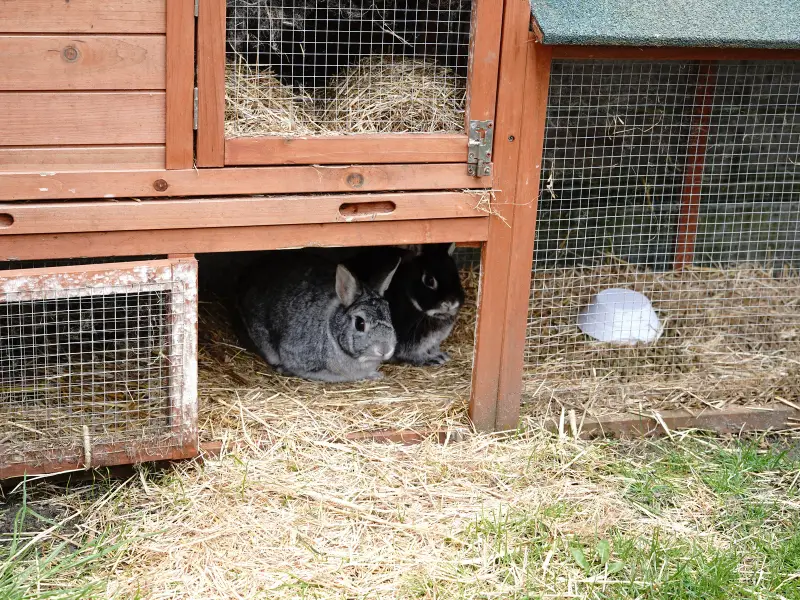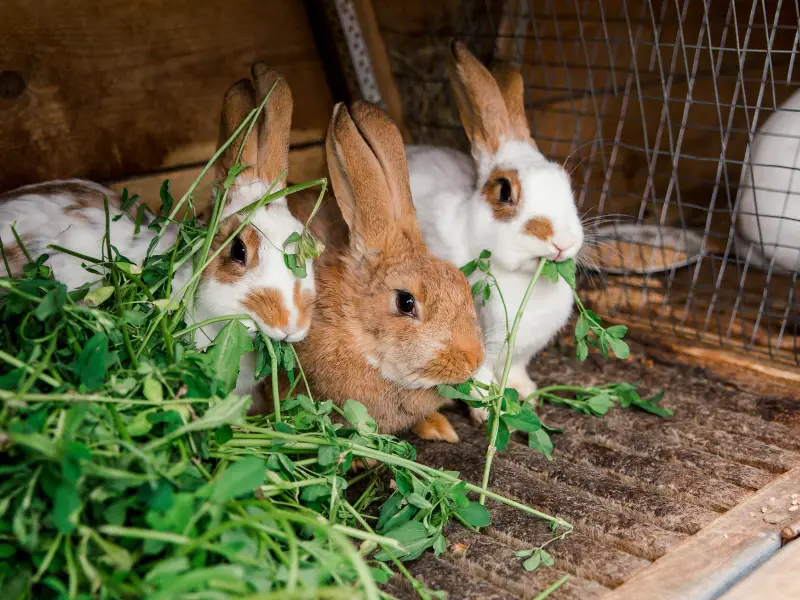When you become a rabbit owner, you need to make peace with the fact that you have adopted a poop machine. Yeah, these little animals poop as they eat.
So, what about rabbit poop in the yard?
Rabbits will poop in the yard if they aren’t litter-trained or feel territorial. A rabbit produces between 200 to 300 poop balls a day, and if they’re outdoors and need to go, they’ll go in the yard. Rabbit poop is good for the soil in your garden and doesn’t smell.
Here’s some more information on rabbit poop, including the benefits and how to get rid of rabbit poop.
Why Does My Rabbit Poop in the Yard?
Let’s take a closer look at why your floppy-eared friend is popping in your yard:
Hasn’t Been Potty Trained
If you haven’t potty trained your bun, it will likely poop in the yard randomly.
Bunnies are animals of habit, and they often pick the same spot to do their business. On closer inspection, you may find that your bun is building up quite a poop pile in the yard.
They’ve Reached Sexual Maturity
When your bun reaches sexual maturity (between 3 and 6 months), they suddenly start to poop and urinate everywhere due to increased hormones.
This can be very frustrating, especially if your bun is potty trained.
Feeling Territorial
Domestic (such as the Mini Rex) and wild rabbits (such as cottontail rabbits) scatter poop and urine to mark their territory. If your bunny feels territorial, you’ll notice a lot more rabbit droppings scattered around your yard.
If you allow your bun to explore a new part of the garden, you’ll also find far more poop balls than usual. If you have other pets in your yard, your bun will scatter their droppings to show ownership over an area.
How Do I Stop Rabbits From Pooping in My Yard?

Bunnies produce between 200 to 300 poop balls daily, and it’s nearly impossible to stop them from pooping in your yard completely. Let’s take a look at how to prevent your rabbit from pooping in your yard:
Potty Training
The first thing to try is potty training a rabbit. This process is easy and will help prevent your bun from pooping in the garden. Set up litter boxes in your bun’s living environment and in easy-to-reach places in your yard.
Once your bun is used to the litter box, it should stop pooping in your yard. It’s important to remember that your bun will sometimes poop outside of the litter box.
You’ll need to be patient and consistent to train your bun successfully.
Sterilize Your Rabbit
Having your bun spayed or neutered will improve its pooping habits significantly. This will stop them from leaving poop balls everywhere and marking their territory.
Once your bun is sterilized, potty training will go much smoother and faster.
Remember, it’ll take a couple of weeks for your rabbit’s hormones to settle once they’ve been sterilized.
Keep Other Pets Away
Try to keep other pets, such as dogs and cats, away from your rabbit’s exercise or playpen in the yard. This will prevent territorial feelings, and your bun shouldn’t feel threatened or need to claim the garden as its own.
If you have two bunnies playing in the same area and they aren’t bonded yet, this could also result in territorial poop scattering. Unfortunately, until the pair have bonded, they’ll display this behavior.
However, it will subside as they become used to one another.
Veterinary Check Up
If your floppy-eared friend is potty trained and suddenly starts pooping more than usual and in random places, this can indicate an underlying health problem.
It’s best to take them for a health checkup if they show any symptoms such as:
- Loss of appetite
- Obvious lethargy
- Hunched over in pain
- Growling when you come near them
Is Rabbit Poop Good for Your Lawn?
Rabbit droppings are excellent when used as a fertilizer, as it’s rich in potassium, phosphorus, and nitrogen. Plus, rabbit poop doesn’t smell like other manure.
It’s organic, and you can use fresh poop or composted poop (also known as bunny honey).
Rabbits eat a healthy and balanced diet, so here’s a look at some of the other benefits of using rabbit poop for your lawn:
- Rabbit poop is 4 times more nutrient dense than horse or cow manure and has twice as many nutrients as chicken manure.
- It can be used fresh, as it doesn’t burn the plant roots.
- Earthworms thrive in rabbit manure, which improves soil quality.
- Fresh rabbit manure is easy to handle and odorless, unlike pig manure.
- Bunny honey contains minerals such as boron, magnesium, calcium, zinc, copper, sulfur, and cobalt.
- A female rabbit and her litter (once they are 4 months old) can produce more than 1 ton of bunny honey a year.
How Long Does It Take Rabbit Poop to Decompose?
Depending on the weather, temperature, and environment, it can take around 180 days for rabbit poop to decompose fully. You can speed up the decomposing process by making a rabbit compost tea, which takes between 3 to 5 days to break down completely.
Rabbit compost tea is made by soaking rabbit droppings (2 cups) in 5 gallons of water. The mixture must be covered and left in a warm and sunny spot. After 3 to 5 days, the mixture can be strained to remove any solids.
Use the bunny brew to water your plants for an extra nutrient boost.
Are Rabbit Droppings Harmful to Humans?
It’s essential to wash your hands thoroughly after handling rabbit droppings as there are parasites that can be passed from rabbits to humans through their poop, such as:
- E.cuniculi is a microscopic kidney and brain parasite that can cause severe symptoms in immune-compromised humans (who have HIV/AIDs or are on chemotherapy).
- Eating rabbit poop can cause ringworm, a parasite that can cause vomiting, nausea, and diarrhea in humans.
My Last Bunny Thoughts
Your rabbit pooping in your garden certainly isn’t the worst thing that could happen. Your bun is actually doing your yard a service by providing nutrients and minerals for free.
Unlike dogs that leave unsightly and smelly poops in inconvenient places, your bun passes small, cocoa-puff-like poop balls that have no smell and aren’t an eye sore.
Start collecting your bun’s poop balls and making some of that wonderful bunny honey. Your garden will love it.
Related Articles:

